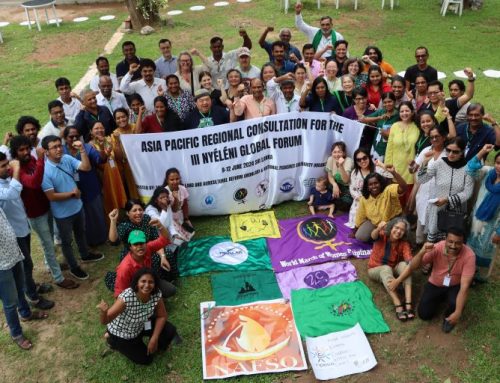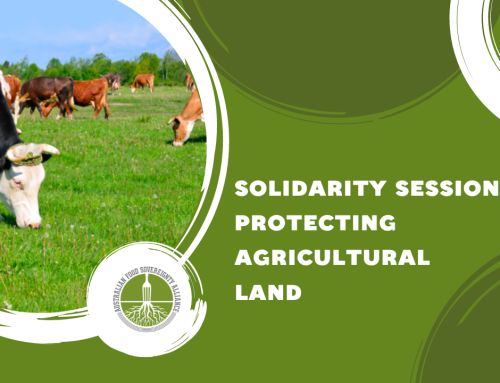AFSA is working towards the establishment of an Agrarian Trust. Our vision for an Agrarian Trust is:
Farmland held in commons, providing First Peoples and agroecology-oriented farmers secure tenure and equitable access to farmland, and promoting fair, just and sovereign local and regional agri-food systems
AFSA’s Agrarian Trust will be an entity that acquires agricultural land, providing secure farming tenure to small-scale agroecology-oriented farmers. Housing for farmers on the land is also envisaged. The properties will be governed by regional bodies, to provide for place-based stewardship and governance.
The vision for the Agrarian Trust in Australia closely follows that for the Agrarian Trust USA:
Agrarian Trust is an organisation to decommodify land, to take it out of the private property regime and hold it in community, with community governance for permanent agroecological stewardship…
It operates as a set of constraints on what its use will be …. In the age of dominion and commodification, you have the right to destroy, the right to extract, the right to mine, the right to intensify, the right to have monoculture. …..but in the Agrarian Trust framing you have a right for regeneration, a right for restoration . . for polyculture, for local food access such that its a spiritual home for its surrounding community of eaters”.
Severine von Tscharner, co-founder of Agrarian Trust USA and Board Chair and President
Agrarian trust: key features
Permanent agroecological stewardship
Agroecology harnesses, maintains and enhances biological and ecological processes in agricultural production, reducing the use of off-farm inputs that include fossil fuels and agrochemicals and creating more diverse, resilient and productive agroecosystems, while promoting everybody’s right to democratically participate in food and agriculture systems.
For further information on agroecology see AFSA’s Agroecology Action Research Network .
In keeping with the principles of agroecology, conservation is integral to AFSA’s Agrarian Trust project. Existing quality native bush on Agrarian Trust properties will be protected through various means, which could include::
- Permanent protection via covenants such as, in Victoria, Trust for Nature’s Conservation Covenant and its new pilot Farm Covenant
- Property management plans that set parameters for farming practices so as to promote agro-ecological farming that enhances the ecological values of the farming areas and the bushland areas. These parameters could be built into the leases to farmers.
Place-based stewardship and governance
Agrarian Trust land will be held in Agrarian Commons which will be structured in a way that ensures local ownership and governance of land and keeps land in the hands of the community closest to it, including First Peoples.
The Commons structure provides for place-based stewardship that respects and harnesses the value of deep connection to and knowledge of place among First Peoples, farmers and local communities.
Secure tenure for farmers
Land access and security of tenure are the most significant barriers for aspiring farmers committed to agroecology in Australia. Rising costs of land and insecure short-term leases drive this problem.
The Agrarian Commons will hold and steward land to convey affordable, equitable leases for the purposes of agroecological farming for secure local food access, ecological sustainability and community benefit.
Get involved
AFSA’s Agrarian Trust working group welcomes collaborators and interested parties – email project lead Michele Sabto to get involved!
Progress to date
AFSA’s Agrarian Trust working group, which has been meeting since May 2023 has prepared a funding application to be submitted to a philanthropic funder in the conservation space. Working to an 18-month project plan, the funds will employ a legal firm and part-time project coordinator to develop three alternative legal structures for the Agrarian Trust, from which one will be chosen.
At the end of this 18-month period, the aim is to have selected the legal structure, drafted the founding documents, appointed office holders, and be ready to work with local communities and landholders to acquire land and bring it into the Agrarian Commons structure.






